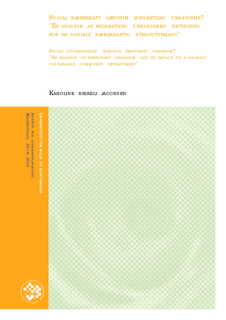| dc.description.abstract | Det er gjort lite forskning på midlertidig urbanisme (MU), en praksis som kjennetegnes gjennom midlertidige aktiviteter og/eller prosjekter initiert av offentlige myndigheter, private eiere eller enkeltpersoner og grupper, som finner sted i tomme bygninger eller brakkområder. Imidlertid har de sosialvitenskaplige forskerne Jacqueline Groth og Eric Corjin fra Centre for Urban Research i Brussel, blant annet hevdet at når midlertidige brukere velger å interagere med lokalsamfunnet, kan dette resultere i sterkere sosiale og kulturelle identiteter. Dette kan styrke sosiale nettverk og fremme empowerment i lokalsamfunnet, dvs. evnen til selv å påvirke og utøve makt på sine omgivelser.
Det er et nasjonalt mål innen stedsutvikling å skape økt deltakelse og autonomi i lokalsamfunnet i Norge. Likevel viser forskning at deler av lokalsamfunnet i for liten grad blir styrket og involvert, og at det er mangel på en sosialt bærekraftig stedsutvikling i dagens praksis. Denne oppgaven tar utgangspunkt i en hypotese om at MU kan være en tilnærming til og et bidrag til en sosialt bærekraftig stedsutvikling i Norge. Oppgaven belyser først begrepet MU og ser nærmere på ulike diskurser knyttet til MU og en sosialt bærekraftig stedsutvikling. Neste del av oppgaven er en casestudie som analyserer to MU-initiativ i Oslo. Begge initiativene har funnet sted i sosialt svake områder, med intensjonen om å interagere med lokalsamfunnet. Teori om sosial kapital og empowerment er testet ut på casestudiet, og vurderer hvorvidt MU-initiativene kan bidra med å styrke sosiale nettverk og deltakelse i et lokalsamfunn.
Oppgavens resultater viser at MU styrker både sosial kapital og empowerment gjennom sin praksis i et lokalsamfunn. Det gjør de ved å styrke partnerskap og samarbeid på tvers av status og maktposisjoner, skape aktive uterom, økt deltakelse gjennom å teste ut ideer på et sted og slik være en katalysator for ny utvikling, og avdekke og aktivere lokale ressurser. Analysen viser også at MU er svært sårbart, og avhengig av ytre variabler for å kunne være et bidrag til en sosialt bærekraftig stedsutvikling. MU er avhengig av samsvar mellom initiativtakernes og MU-brukernes intensjon og motivasjon. Et samarbeid mellom MU-initiativet, offentlige myndigheter og offentlige/private eiere er av betydning, for å unngå at økonomisk verdistigning skjer på bekostning av sosial verdiskaping. Skal MU bidra til en langsiktig sosialt bærekraftig stedsutvikling, bør MU få innflytelse på fremtidig utvikling av et sted, og ikke kun implementeres som en aktivitet mellom to permanente tiltak. There has been little research on temporary urbanism, which is a practice characterized by
temporary activities and/or projects initiated by public government officials, private owners
or individuals and groups, who find space in empty buildings or abandonded land. The
social science researchers Jacqueline Groth and Eric Corjin from the Centre of Urban
Research have claimed that when temporary users choose to interact with the local
community, it can result in stronger social and cultural identities. This can further improve
social networks and encourage empowerment in the local community, which means the
ability to influence and exercise power upon its surroundings.
It is a national goal within community development (stedsutvikling) to enhance participation
and autonomy within the local communities in Norway. However, recent research shows
that parts of the local community is being inadequately strengthened and involved, and
there is a lack of social sustainability in community development today. This thesis is
based on the hypothesis that temporary urbanism can be an approach and a contribution
to socially sustainable community development in Norway. The thesis first sheds light on
the term temporary urbanism, and scrutinizes different discourses connected to to
temporary urbanism and socially sustainable community development. The next part of the
thesis is a casestudy which analyzes two temporary initiatives in Oslo. Both of the
initiatives analyzed found place in socially disadvantaged areas, and aimed to interact with
the local community. The casestudy has been analyzed within the framework of social
capital and empowerment theory, and evaluates whether temporary initiatives can
contribute to strengthened social networks and community participation.
The results of the thesis illustrates that temporary urbanism strengthens both social capital
and empowerment in a local community. This is achieved by strengthening partnerships
and collaboration across social/socioeconomic status and power positions, creating active
public spaces, enhancing participation by testing ideas, being a catalyst for new
development, and by uncovering and activating/mobilizing local resources. The analysis
also uncovers how temporary urbanism is vulnerable, and dependent upon external
factors in order to be a contribution to more socially sustainable community development.
Temporary urbanism is dependent on the motivation and intention of the initiators and
participants. It is important that their motivation correlate. A collaboration between the
temporary urbanism initiative, public government and private owners is furthermore crucial to avoid that enhanced social value is sacrificed for the sake of economic gains. If
temporary urbanism is to contribute to socially sustainable community development, it
needs to be in a position to exercise influence on the future development of a place, and
not only be implemented as an activity in between two permanent plans. | no_NO |
